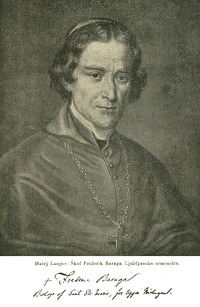
Source: Courtesy of Wikimedia Commons
BARAGA, FREDERIC (Irenaeus Fridericus, Irenej Friderik, Friedrich), Roman Catholic priest, missionary, and bishop; b. 29 June 1797 near Dobrnič (Yugoslavia) at the castle of Malavas where his father was overseer, son of Maria Katharina Josefa Jenčič and Johann Nepomuc Baraga; d. 19 Jan. 1868 at Marquette, Mich.
Frederic Baraga was born into a prosperous Slovenian family, but not into the nobility as has sometimes been stated. He received his early education from tutors and at Laibach (Ljubljana, Yugoslavia) before studying law at the University of Vienna and entering the seminary at Laibach. He was ordained a priest on 21 Sept. 1823 and surrendered all rights to the family estates in order to take up pastoral work in the diocese of Laibach. He was soon attracted to foreign missions and in 1829, when the Leopoldine Society was established in Vienna to encourage missionary activity, he applied to be sent to the diocese of Cincinnati in the United States. Baraga was the first missionary sponsored by the society and arrived in New York City on 31 Dec. 1830. He was already fluent in several European languages including English and French.
After studying Ojibwa at Cincinnati, where he also preached to German congregations, Baraga set out in 1831 for Arbre Croche (Harbor Springs), a settlement of some 650 people in Michigan. In 1833 he went to Grand River (Grand Rapids, Mich.), in 1835 to La Pointe (Wis.), and in 1843 to L’Anse on Keweenaw Bay, where he established a mission. In 1848 he was named a vicar general of the diocese of Detroit and in 1853 bishop of Amyzonia responsible for the diocese of Upper Michigan. His episcopal seat was Sault Ste Marie (Mich.) until 1865 when he transferred to Marquette.
Baraga’s first missions in the United States were among mixed populations which included Indians and fur-traders, many of them retired and many of them French Canadians or Métis. Because there were few Catholic missionaries in much of the territory north of lakes Huron and Superior Baraga soon made occasional missionary trips in the 1840s to settlements in this area, where he again served fur-traders and Indians. He depended at first on the bishop of Quebec, then after 1837 on the bishop of Kingston, to provide him with a share in the Leopoldine grants to carry on his work in Canadian territory. As a bishop himself after 1853 he was delegated jurisdiction by the bishop of Toronto for the missions on the north shore of Lake Superior from Bruce Mines to Fort William (Thunder Bay, Ont.), including the Jesuit missions at Fort William (where Father Dominique Duranquet served) and Garden River (under the care of Father Auguste Kohler), as well as the Indian missions at Michipicoton, Lake Nipigon, and Pic. In October 1854 he confirmed 44 persons at Garden River, the first confirmation to be held there. In 1856 the missions were transferred to the charge of Bishop John Farrell* of Hamilton, but responsibility for them continued to be delegated to Baraga. However, he himself served only the area around the Canadian Sault Ste Marie where, he said, “there are many Indians . . . who cannot speak but Indian” and he could provide better service to them. He visited the Sault regularly, and in 1862 celebrated the first Mass at Goulais Bay, some 20 miles to the north, in a church which he had begun.
Baraga’s services as a missionary to the Indians in what became northern Ontario were extensive and pioneering, but his influence on both contemporary and later missionaries working among the Indians in Canada is the most significant aspect of his career. Before coming to North America he had published prayer books in Slovenian, and as early as 1832 he published one in Ojibwa. He published numerous prayer books, books of meditation, and other devotional works in Indian languages, several of which went through many editions. He also published a volume in German on the customs of the Indians. His most significant works, however, were a grammar of the Ojibwa language, first published in Detroit in 1850, and an Ojibwa dictionary, in 1853. Both volumes were indispensable to missionaries wishing to learn the language, and were printed numerous times. Father Albert Lacombe* published editions of the two works in Montreal in 1878–80.
Bishop Baraga died at Marquette in 1868. His cultural and linguistic influence on later missionaries and on the study of the Ojibwa language and its dialects was felt well into the 20th century and his works continue to be republished and studied.
Frederic Baraga’s principal works were the following: A theoretical and practical grammar of the Otchipwe language, the language spoken by the Chippewa Indians . . . (Detroit, 1850; 2nd ed., [ed. Albert Lacombe], Montreal, 1878); and A dictionary of the Otchipwe language, explained in English . . . (Cincinnati, Ohio, 1853; new ed., [ed. Albert Lacombe], 2v., Montreal, 1878–80). References to other editions of these works and to other works by Baraga can be found in R. P. Cujes, Ninidjanissidog saiagiinagog; contribution of the Slovenes to the socio-cultural development of the Canadian Indians (Antigonish, N.S., 1968), and National union catalog. Appleton’s cyclopædia of American biography, ed. J. G. Wilson et al. (10v., New York, 1887–1924), I. DAB. Lorenzo Cadieux et Ernest Comte, Un héros du Lac Supérieur, Frédéric Baraga (Soc. historique du Nouvel-Ontario, Documents historiques, no.27, Sudbury, Ont., 1954). Chrysostom Verwyst, Life and labors of Rt. Rev. Frederic Baraga, first bishop of Marquette, Mich. . . . (Milwaukee, Wis., 1900).
© 1976–2024 University of Toronto/Université Laval
Image Gallery


Cite This Article
J. S. McGivern, “BARAGA, FREDERIC,” in Dictionary of Canadian Biography, vol. 9, University of Toronto/Université Laval, 2003–, accessed April 18, 2024, http://www.biographi.ca/en/bio/baraga_frederic_9E.html.
The citation above shows the format for footnotes and endnotes according to the Chicago manual of style (16th edition). Information to be used in other citation formats:
| Permalink: | http://www.biographi.ca/en/bio/baraga_frederic_9E.html |
| Author of Article: | J. S. McGivern |
| Title of Article: | BARAGA, FREDERIC |
| Publication Name: | Dictionary of Canadian Biography, vol. 9 |
| Publisher: | University of Toronto/Université Laval |
| Year of publication: | 1976 |
| Year of revision: | 1976 |
| Access Date: | April 18, 2024 |








